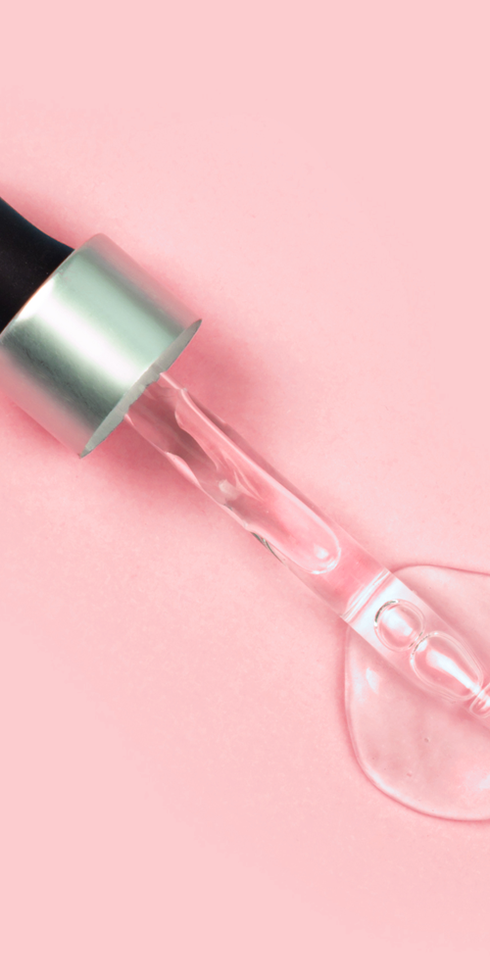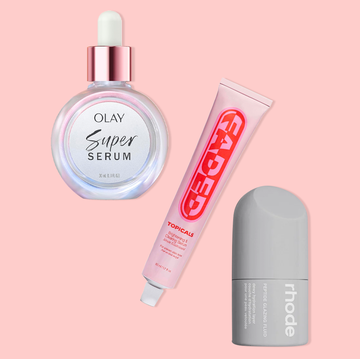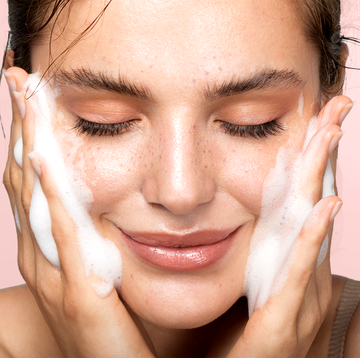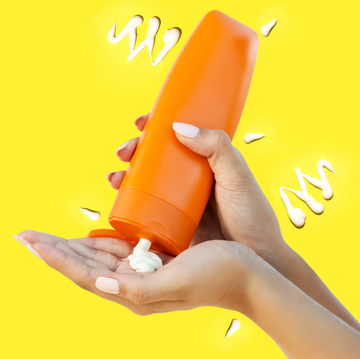In the skincare world, buzzy ingredients are a dime a dozen. But the super-trendy ingredient hyaluronic acid (HA) is actually here to stay. It's a powerhouse hydrator that's safe for virtually all skin types and can be found in everything from eye cream to face serum. But what is hyaluronic acid? "Naturally produced in the human body, [hyaluronic acid] is type of a sugar molecule that keeps our tissues cushioned and lubricated," explains Birnur Aral, Ph.D., director of the Good Housekeeping Institute Beauty Lab. "It is found in skin, joints, and connective tissue."
Don't be intimidated by the word "acid" in its name: Unlike exfoliating alpha- and beta- hydroxy acids or salicylic acid, HA is actually a gentle hydrator. In fact, when it's formulated for skincare, "hyaluronic acid is like a sponge that finds up to 1,000 times its weight in water," says Joshua Zeichner, M.D., director of cosmetic and clinical research in dermatology at Mount Sinai Hospital in New York City. "It is what gives the skin its plumpness."
What is hyaluronic acid good for?
Skincare products with HA work hard to bring moisture to your skin all day by consistently drawing hydration from the air into your skin. In Beauty Lab tests, we've found that products with hyaluronic acid can hydrate skin extremely efficiently: Sometimes 400% better than creams 18 times the price, as we saw with Olay Regenerist Micro-Sculpting Cream. Here's what HA is best at:
- Hydrating. "Hyaluronic acid is a skin plumper by way of its ability to retain moisture," says Brendan Camp, M.D., double board-certified dermatologist and dermatopathologist at Medical Dermatology & Cosmetic Surgery in New York City. "It helps to hydrate dry skin, providing a smooth, soft appearance."
- Anti-aging. "As we age our skin produces less HA, contributing to the appearance of wrinkles," Dr. Camp explains. Hyaluronic acid hydrates and plumps skin to "improve the appearance of fine lines and wrinkles," says Dr. Zeichner.
- Joint pain. Yes, really — but not applied topically. "Hyaluronic acid injections are also given to joints of people suffering from arthritis," says Aral. HA supplements are also popular for those suffering from joint pain and osteopenia.
What are the side effects of hyaluronic acid?
"Hyaluronic acid is something your body naturally makes, so it is generally considered safe [for all skin types]," says Dr. Camp. Allergic reactions to HA are rare, so that means whether you have oily skin, sensitive, dry skin, or combination skin, you have the green light to use hyaluronic acid products. Our pros note that HA is particularly helpful for parched skin in need of deep hydration.
What hyaluronic acid products are best?
"Because it works by retaining skin moisture, [HA] is most often found in products that are left on the skin," says Dr. Camp. "It can be found in face creams, serums, masks, eye creams, and body lotions." Even on sensitive skin, "it can be used twice daily," says Dr. Zeichner. "If you are dry, I typically recommend it as a serum under your moisturizer." Keep in mind that your favorite skincare products might already be laced with hyaluronic acid: Check the label for mention of "sodium hyaluronate."
What are hyaluronic acid injectables?
If you feel that your fine lines and sallowness are too much for topical skincare products to tackle, keep in mind that "hyaluronic acid is the ingredient in fillers like Juvéderm and Restylane that are used to volumize the skin," says Dr. Camp. Put simply, the injectable form of HA smooths out skin by increasing the volume in lips, cheeks, or any other area that may be prone to signs of aging, says Aral. These injections are temporary and will be broken down by enzymes in the body in six months to a year's time.
Jessica (she/her) is a deputy editor at the Good Housekeeping Institute and a longtime product tester, reviewer, writer and editor of beauty and lifestyle content. She has over a decade of industry experience, previously as beauty editor at USA Today's Reviewed where she launched the Beauty vertical and tested hundreds of products and has covered trends for publications like The Boston Globe and The New York Times. You can usually find her sorting through piles of beauty products — and testing the best ones on camera.


















